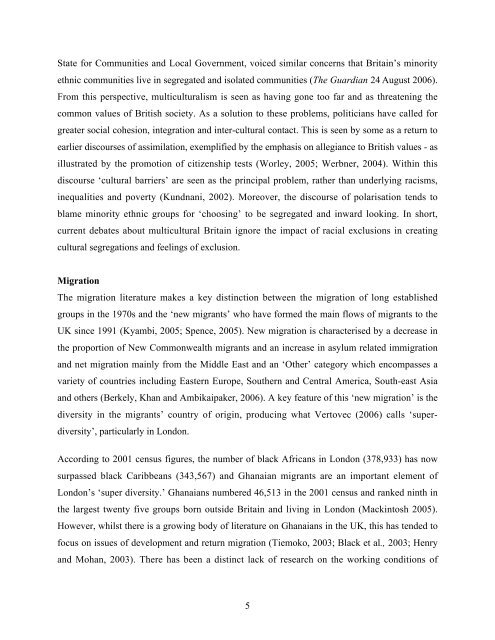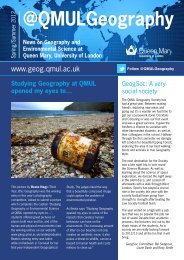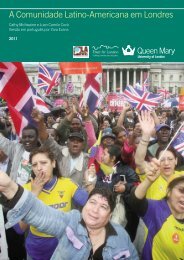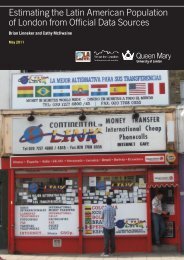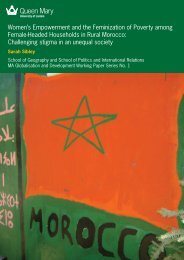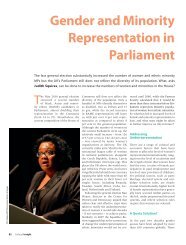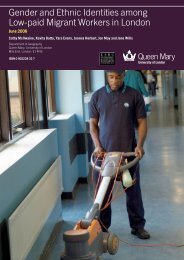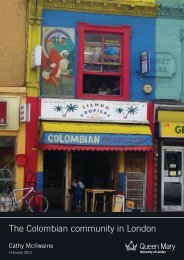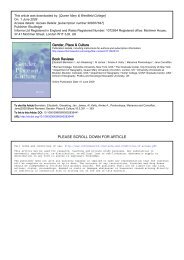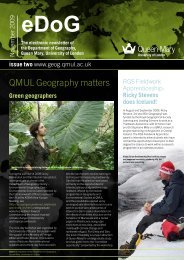Multiculturalism at work: The experiences of Ghanaians in London
Multiculturalism at work: The experiences of Ghanaians in London
Multiculturalism at work: The experiences of Ghanaians in London
- No tags were found...
Create successful ePaper yourself
Turn your PDF publications into a flip-book with our unique Google optimized e-Paper software.
St<strong>at</strong>e for Communities and Local Government, voiced similar concerns th<strong>at</strong> Brita<strong>in</strong>’s m<strong>in</strong>orityethnic communities live <strong>in</strong> segreg<strong>at</strong>ed and isol<strong>at</strong>ed communities (<strong>The</strong> Guardian 24 August 2006).From this perspective, multiculturalism is seen as hav<strong>in</strong>g gone too far and as thre<strong>at</strong>en<strong>in</strong>g thecommon values <strong>of</strong> British society. As a solution to these problems, politicians have called forgre<strong>at</strong>er social cohesion, <strong>in</strong>tegr<strong>at</strong>ion and <strong>in</strong>ter-cultural contact. This is seen by some as a return toearlier discourses <strong>of</strong> assimil<strong>at</strong>ion, exemplified by the emphasis on allegiance to British values - asillustr<strong>at</strong>ed by the promotion <strong>of</strong> citizenship tests (Worley, 2005; Werbner, 2004). With<strong>in</strong> thisdiscourse ‘cultural barriers’ are seen as the pr<strong>in</strong>cipal problem, r<strong>at</strong>her than underly<strong>in</strong>g racisms,<strong>in</strong>equalities and poverty (Kundnani, 2002). Moreover, the discourse <strong>of</strong> polaris<strong>at</strong>ion tends toblame m<strong>in</strong>ority ethnic groups for ‘choos<strong>in</strong>g’ to be segreg<strong>at</strong>ed and <strong>in</strong>ward look<strong>in</strong>g. In short,current deb<strong>at</strong>es about multicultural Brita<strong>in</strong> ignore the impact <strong>of</strong> racial exclusions <strong>in</strong> cre<strong>at</strong><strong>in</strong>gcultural segreg<strong>at</strong>ions and feel<strong>in</strong>gs <strong>of</strong> exclusion.Migr<strong>at</strong>ion<strong>The</strong> migr<strong>at</strong>ion liter<strong>at</strong>ure makes a key dist<strong>in</strong>ction between the migr<strong>at</strong>ion <strong>of</strong> long establishedgroups <strong>in</strong> the 1970s and the ‘new migrants’ who have formed the ma<strong>in</strong> flows <strong>of</strong> migrants to theUK s<strong>in</strong>ce 1991 (Kyambi, 2005; Spence, 2005). New migr<strong>at</strong>ion is characterised by a decrease <strong>in</strong>the proportion <strong>of</strong> New Commonwealth migrants and an <strong>in</strong>crease <strong>in</strong> asylum rel<strong>at</strong>ed immigr<strong>at</strong>ionand net migr<strong>at</strong>ion ma<strong>in</strong>ly from the Middle East and an ‘Other’ c<strong>at</strong>egory which encompasses avariety <strong>of</strong> countries <strong>in</strong>clud<strong>in</strong>g Eastern Europe, Southern and Central America, South-east Asiaand others (Berkely, Khan and Ambikaipaker, 2006). A key fe<strong>at</strong>ure <strong>of</strong> this ‘new migr<strong>at</strong>ion’ is thediversity <strong>in</strong> the migrants’ country <strong>of</strong> orig<strong>in</strong>, produc<strong>in</strong>g wh<strong>at</strong> Vertovec (2006) calls ‘superdiversity’,particularly <strong>in</strong> <strong>London</strong>.Accord<strong>in</strong>g to 2001 census figures, the number <strong>of</strong> black Africans <strong>in</strong> <strong>London</strong> (378,933) has nowsurpassed black Caribbeans (343,567) and Ghanaian migrants are an important element <strong>of</strong><strong>London</strong>’s ‘super diversity.’ <strong>Ghanaians</strong> numbered 46,513 <strong>in</strong> the 2001 census and ranked n<strong>in</strong>th <strong>in</strong>the largest twenty five groups born outside Brita<strong>in</strong> and liv<strong>in</strong>g <strong>in</strong> <strong>London</strong> (Mack<strong>in</strong>tosh 2005).However, whilst there is a grow<strong>in</strong>g body <strong>of</strong> liter<strong>at</strong>ure on <strong>Ghanaians</strong> <strong>in</strong> the UK, this has tended t<strong>of</strong>ocus on issues <strong>of</strong> development and return migr<strong>at</strong>ion (Tiemoko, 2003; Black et al., 2003; Henryand Mohan, 2003). <strong>The</strong>re has been a dist<strong>in</strong>ct lack <strong>of</strong> research on the <strong>work</strong><strong>in</strong>g conditions <strong>of</strong>5


